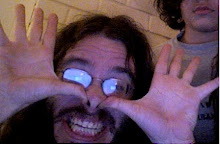A General Theory of the Development of Forms (wouldn't it be nice to have one?)
This blog entry briefly describes a long-term conceptual research project I have in mind, and have been thinking about for a while, which is to try to figure out some sort of "general theory of the development of forms/patterns in growing complex systems."
Since the Novamente AGI high-level design and the "patternist philosophy of mind" are basically completed and stable for a while (though I'm still engaged with writing them up), I need a new conceptual obsession to absorb the extremely-abstract-thinking portion of my brain... ;-)
Thinking about the development of forms, I have in mind three main specific areas:
Each of these is a big area and I've decided to proceed through them in this order. Maybe I will never get to the physics part and will just try to abstract a general theory of development from the first two cases, we'll see.
I also have an intuition that it may be useful to use formal language theory of some sort as a conceptual tool for expressing developmental stages and patterns. Piaget tried to use abstract algebra in some of his writings, which was a nice idea, but didn't quite work. This ties in with Jerry Fodor's notion of a "language of thought", which I don't buy quite in all the senses he means it, but may have some real meat to it. It may be that developing minds at different stages. I don't know if anyone has taken this approach in the developmental psych literature.
For instance, it's arguable that quantifier binding is only added to the human language of thought at Piaget's formal stage, and that recursion is only added to the human language of thought at Piaget's concrete operational stage (which comes along with phrase structure syntax as opposed to simpler proto-language). What I mean by "X is added to the human language of thought at stage S" is something like "X can be used with reasonable generality and fluidity at stage S" -- of course many particular instances of recursion are used before the pre-operational phase, and many particular instances of quantifier binding are used before the formal phase. But the full "syntax"of these operations is not mastered prior to the stages I mentioned, I suggest. (Note that I am using Piaget's stage-labels only for convenience, I don't intend to use them in my own theory of forms; if I take a stage-based approach at all then I will define my own stages.)
I note that formal language theory is something that spans different domain areas in the sense that
Since the Novamente AGI high-level design and the "patternist philosophy of mind" are basically completed and stable for a while (though I'm still engaged with writing them up), I need a new conceptual obsession to absorb the extremely-abstract-thinking portion of my brain... ;-)
Thinking about the development of forms, I have in mind three main specific areas:
- developmental psychology (in humans and AI's)
- epigenesis in biological systems
- the growth of the early universe: the emergence of physical law from lawlessness, etc. (cf John Wheeler)
Each of these is a big area and I've decided to proceed through them in this order. Maybe I will never get to the physics part and will just try to abstract a general theory of development from the first two cases, we'll see.
I also have an intuition that it may be useful to use formal language theory of some sort as a conceptual tool for expressing developmental stages and patterns. Piaget tried to use abstract algebra in some of his writings, which was a nice idea, but didn't quite work. This ties in with Jerry Fodor's notion of a "language of thought", which I don't buy quite in all the senses he means it, but may have some real meat to it. It may be that developing minds at different stages. I don't know if anyone has taken this approach in the developmental psych literature.
For instance, it's arguable that quantifier binding is only added to the human language of thought at Piaget's formal stage, and that recursion is only added to the human language of thought at Piaget's concrete operational stage (which comes along with phrase structure syntax as opposed to simpler proto-language). What I mean by "X is added to the human language of thought at stage S" is something like "X can be used with reasonable generality and fluidity at stage S" -- of course many particular instances of recursion are used before the pre-operational phase, and many particular instances of quantifier binding are used before the formal phase. But the full "syntax"of these operations is not mastered prior to the stages I mentioned, I suggest. (Note that I am using Piaget's stage-labels only for convenience, I don't intend to use them in my own theory of forms; if I take a stage-based approach at all then I will define my own stages.)
I note that formal language theory is something that spans different domain areas in the sense that
- there's discussion of "language of thought" in a general sense
- natural language acquisition is a key aspect of developmental psych
- L-system theory shows that formal languages are useful for explaining and modeling plant growth
- "Symbolic dynamics" uses formal language theory to study the dynamics of chaotic dynamical systems in any domain, see also Crutchfield and Young
So it seems to be a potentially appropriate formal tool for such a project.
I was discussing this with my friend Stephan Bugaj recently and he and I may write a book on this theme if we can pull our thinking together into a sufficiently organized form....

